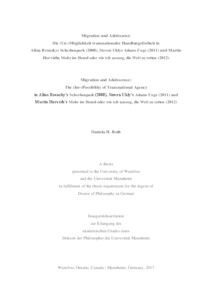|
Migration und Adoleszenz : die (Un-)Möglichkeit transnationaler Handlungsfreiheit in Alina Bronskys "Scherbenpark" (2008), Steven Uhlys "Adams Fuge" (2011) und Martin Horváths "Mohr im Hemd oder wie ich auszog, die Welt zu retten" (2012)
Roth, Daniela Hildegard
![[img]](https://madoc.bib.uni-mannheim.de/44302/1.hassmallThumbnailVersion/Roth%20Daniela_Die%20Unm%C3%B6glichkeit%20transnationaler%20Handlungsfreiheit.pdf)  Vorschau |
|
PDF
Roth Daniela_Die Unmöglichkeit transnationaler Handlungsfreiheit.pdf
- Veröffentlichte Version
Download (2MB)
|
|
URL:
|
https://madoc.bib.uni-mannheim.de/44302
|
|
URN:
|
urn:nbn:de:bsz:180-madoc-443022
|
|
Dokumenttyp:
|
Dissertation
|
|
Erscheinungsjahr:
|
2018
|
|
Ort der Veröffentlichung:
|
Mannheim
|
|
Hochschule:
|
Universität Mannheim
|
|
Gutachter:
|
Fetscher, Justus
|
|
Datum der mündl. Prüfung:
|
29 August 2017
|
|
Sprache der Veröffentlichung:
|
Deutsch
|
|
Einrichtung:
|
Philosophische Fakultät > Neuere deutsche Literaturwissenschaft I (Fetscher 2010-)
|
|
Fachgebiet:
|
800 Literatur, Rhetorik, Literaturwissenschaft
|
|
Normierte Schlagwörter (SWD):
|
Migrantenliteratur , Adoleszenz , Transnationalismus , Scherbenpark , Alina Bronsky , adolescence , agency , Permovativität
|
|
Freie Schlagwörter (Deutsch):
|
transnationale Literatur, Adoleszenzroman, Adoleszenzliteratur, Handlungsfreiheit, Mobilität, Adams Fuge, Steven Uhly, Mohr im Hemd oder wie ich auszog, die Welt zu retten, Martin Horváth
|
|
Freie Schlagwörter (Englisch):
|
transnational literature , precarity , migration literature
|
|
Abstract:
|
This dissertation project examines the depiction of migration experience and adolescence in Alina Bronsky’s "Scherbenpark" (2008), Steven Uhly’s "Adams Fuge" (2011) and Martin Horváth’s "Mohr im Hemd oder wie ich auszog, die Welt zu retten" (2012), three transnational novels. Transnationalism has been a popular concept in literary and cultural studies for several years and mostly replaced the theoretical categories and methodological approaches offered by intercultural studies. Transnationalism promotes aspects of (cultural) mobility, fluidity, and hybridity that aim to deconstruct binaries and the concept of national literature. The bases for this dissertation project are the following research questions: Why do these novels combine the topics of migration and adolescence? Why do they emphasize the protagonists’ individual traumatic experiences? And what are the belief systems that are transported in these texts? The goal of this research project is to further examine the function of transnationality in these texts, specifically in terms of the transnational concepts of identity that are employed. Here, the analysis focuses on the depiction of the possibility of mobility and agency that is suggested in the idea of a transnational identity, asking, how is agency presented and reflected in these texts?
I argue that, by combining migration, adolescence and trauma, the novels show that their protagonists are denied any real possibility of agency and autonomy. Migrants in these novels are not able to create so-called transnational identities because they are defined by discourses that assign particular identities to them. Furthermore, through my analysis I will demonstrate that this agency cannot exist at all, and so cannot be achieved by anyone. Accordingly, what the concepts of transnational mobility and agency are doing here is covering up societal insecurities that are caused by the continuous progress of globalization and neoliberalism, and the accompanying feeling of loss of control. Through my analysis, these insecurities are visible in the novels and the normative and recolonizing tendencies in societies are exposed.
In order to show this, I first present the history of migration literature, as well as theoretical influences and important terminology that are applied in the analysis of this literature, including important theoretical turns and paradigm shifts.
I claim that the current use of the term transnationalism establishes a new cultural norm that not only covers up social insecurities, but also has a normative stance, in that it produces an ideal that people aspire to – but cannot reach. This forms the connection to adolescence and the question of identity construction during that phase, where adulthood and successful assimilation are presented as the overarching goal. The term (post)adolescence, similar to transnationalism, shows a normative stance in that it idealizes the state of in-betweeness as a form of subversive hybrid subjectivity, but also implies that there is a “correct” way to mature. Building on poststructuralist and postmodernist concepts that question the existence of a prediscursive subject, and on the idea of the precariousness of identity and the concept of precarity, this dissertation presents strategies of narrative, performative, and situative identity construction as a way to form one’s identity within this framework. The analysis of the three novels shows that the protagonists attempt to achieve agency and authority over their lives and stories by applying the aforementioned strategies of identity construction. By emphasizing their trauma and the narrative unreliability of the narrators, these attempts and their subversive notions are undermined, and the texts ultimately show that this freedom and mobility does not exist for the portrayed immigrants, but also that, within the aforementioned discursive structures, the ideal of transnational mobility cannot be achieved by anyone at all.
|
|
Übersetzter Titel:
|
Migration and adolescence : the (im-)possibility of transnational aggency in Alina Bronsky’s "Scherbenpark" (2008), Steven Uhly’s "Adams Fuge" (2011) and
Martin Horváth’s "Mohr im Hemd oder wie ich auszog, die Welt zu retten" (2012)
(Englisch)
|
 | Dieser Eintrag ist Teil der Universitätsbibliographie. |
 | Das Dokument wird vom Publikationsserver der Universitätsbibliothek Mannheim bereitgestellt. |
 Suche Autoren in Suche Autoren in
Sie haben einen Fehler gefunden? Teilen Sie uns Ihren Korrekturwunsch bitte hier mit: E-Mail
Actions (login required)
 |
Eintrag anzeigen |
|



 Suche Autoren in
Suche Autoren in